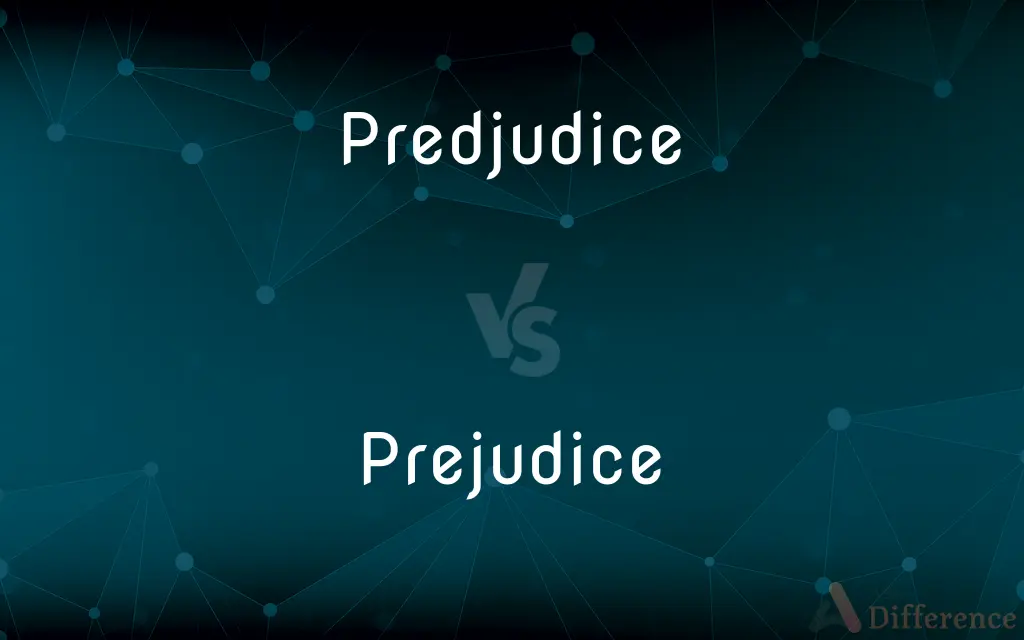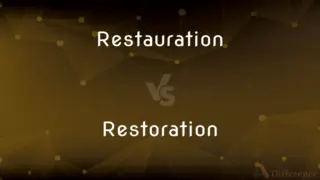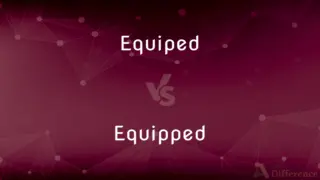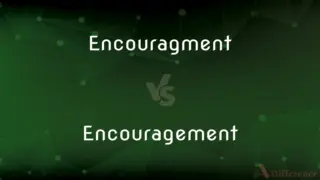Predjudice vs. Prejudice — Which is Correct Spelling?
Edited by Tayyaba Rehman — By Fiza Rafique — Updated on April 1, 2024
"Predjudice" is a misspelling; the correct spelling is "prejudice" – an unfounded or biased opinion or feeling.

Table of Contents
Which is correct: Predjudice or Prejudice
How to spell Prejudice?

Predjudice
Incorrect Spelling

Prejudice
Correct Spelling
ADVERTISEMENT
Key Differences
Remember it starts with "pre-" as in "preview" or "predict."
The "i" comes before the "c," just like in "justice."
There's no "d" after "pre" in "prejudice."
Link the word to "judge," as prejudice involves making judgments without full knowledge.
Think of it as "pre-judging" someone or something without reason.
ADVERTISEMENT
How Do You Spell Prejudice Correctly?
Incorrect: She faced a lot of predjudice at her new school.
Correct: She faced a lot of prejudice at her new school.
Incorrect: Educating children about diversity can help reduce predjudice.
Correct: Educating children about diversity can help reduce prejudice.
Incorrect: The law is designed to protect against racial predjudice.
Correct: The law is designed to protect against racial prejudice.
Incorrect: Efforts are being made to eliminate predjudice in the workplace.
Correct: Efforts are being made to eliminate prejudice in the workplace.
Incorrect: He realized his opinion was based on predjudice rather than fact.
Correct: He realized his opinion was based on prejudice rather than fact.
Prejudice Definitions
A bias that prevents objective consideration of an issue or situation.
It's important to approach matters without prejudice.
A detriment or injury caused by an action or judgment.
The defendant claimed prejudice due to media coverage.
Irrational feelings, attitudes, or opinions held about a particular group.
Prejudice can often lead to discrimination.
The act or state of holding unreasonable preconceived judgments or convictions
“This is not actually a volume of the best short stories … These are just the stories that I like best, and I am full of prejudice and strong opinions” (Ann Patchett).
An adverse judgment or opinion formed unfairly or without knowledge of the facts
A boy with a prejudice against unfamiliar foods.
Irrational suspicion or hatred of a particular social group, such as a race or the adherents of a religion.
Detriment or harm caused to a person, especially in a legal case
The delay operated to her prejudice.
Preclusionary effect, preventing further pursuit of one's interests
The case was dismissed with prejudice.
To fill with prejudice or cause to judge with prejudice
My rural upbringing has prejudiced me against living in the city.
To affect detrimentally or harmfully by a judgment or act
Negative media coverage prejudiced people's opinion of the mayor.
(countable) An adverse judgment or opinion formed beforehand or without knowledge of the facts.
(countable) A preconception, any preconceived opinion or feeling, whether positive or negative.
(countable) An irrational hostile attitude, fear or hatred towards a particular group, race or religion.
I am free of all prejudices. I hate everyone equally.
(obsolete) Knowledge formed in advance; foresight, presaging.
Mischief; hurt; damage; injury; detriment.
(transitive) To have a negative impact on (someone's position, chances etc.).
(transitive) To cause prejudice in; to bias the mind of.
Misspelling of prejudiced
Foresight.
Naught might hinder his quick prejudize.
An opinion or judgment formed without due examination; prejudgment; a leaning toward one side of a question from other considerations than those belonging to it; an unreasonable predilection for, or objection against, anything; especially, an opinion or leaning adverse to anything, without just grounds, or before sufficient knowledge.
Though often misled by prejudice and passion, he was emphatically an honest man.
A bias on the part of judge, juror, or witness which interferes with fairness of judgment.
To cause to have prejudice; to prepossess with opinions formed without due knowledge or examination; to bias the mind of, by hasty and incorrect notions; to give an unreasonable bent to, as to one side or the other of a cause; as, to prejudice a critic or a juryman.
Suffer not any beloved study to prejudice your mind so far as to despise all other learning.
To obstruct or injure by prejudices, or by previous bias of the mind; hence, generally, to hurt; to damage; to injure; to impair; as, to prejudice a good cause.
Seek how may prejudice the foe.
A partiality that prevents objective consideration of an issue or situation
Disadvantage by prejudice
Influence (somebody's) opinion in advance
Prejudice refers to a preconceived opinion not based on actual experience.
His actions were influenced by his racial prejudice.
An unfavorable opinion formed beforehand without knowledge or reason.
She held a deep-seated prejudice against newcomers.
Prejudice Meaning in a Sentence
The novel explores themes of love and prejudice in the 19th century.
Prejudice can be based on various factors, including race, gender, and religion.
Prejudice against certain groups is a significant issue that society must address.
Addressing prejudice requires both individual and collective effort.
His experiences taught him the harmful effects of prejudice on individuals and communities.
To overcome prejudice, it's important to challenge our own assumptions and biases.
Prejudice often stems from ignorance and fear of the unknown.
Educational programs aim to combat prejudice by teaching empathy and respect for all.
Prejudice in any form is a barrier to equality and justice.
Social media campaigns have been launched to raise awareness about prejudice.
Historical events show how prejudice can lead to discrimination and violence.
Confronting one's own prejudice is the first step towards change.
Literature and art have long been used as tools to examine and challenge prejudice.
Efforts to reduce prejudice are an ongoing challenge that requires vigilance and commitment.
Activists are working tirelessly to highlight and fight prejudice in all areas of society.
Understanding the historical roots of prejudice can help in devising effective strategies to combat it.
Prejudice can be subtle and may not always be immediately obvious.
Workshops on prejudice and inclusion are becoming more common in corporate settings.
Parents play a crucial role in teaching their children to recognize and reject prejudice.
Legal systems worldwide are evolving to better address and punish acts of prejudice.
Common Curiosities
Why is it called prejudice?
The term "prejudice" comes from Latin "praejudicium," meaning "prior judgment" or "judging beforehand."
What is the root word of prejudice?
The root comes from Latin "praejudicium," which means "prior judgment."
What is the verb form of prejudice?
The verb form is "prejudice" (e.g., to prejudice someone against something).
What is the pronunciation of prejudice?
Prejudice is pronounced as /ˈprɛdʒ.ə.dɪs/.
What is the plural form of prejudice?
"Prejudices."
Which conjunction is used with prejudice?
Any conjunction can be used based on context, e.g., "and" or "or."
What is the singular form of prejudice?
"Prejudice."
Which vowel is used before prejudice?
Typically, "a" as in "a prejudice."
Which preposition is used with prejudice?
"Against" (e.g., prejudice against a group).
Is prejudice a noun or adjective?
"Prejudice" is primarily a noun, but can also be a verb.
Is prejudice an adverb?
No, "prejudice" is not an adverb.
Is prejudice an abstract noun?
Yes, "prejudice" is an abstract noun.
Is prejudice a negative or positive word?
"Prejudice" generally has a negative connotation.
Is prejudice a collective noun?
No, "prejudice" is not a collective noun.
Is the prejudice term a metaphor?
No, but it can be used metaphorically.
How do we divide prejudice into syllables?
Prej-u-dice.
What part of speech is prejudice?
"Prejudice" is primarily a noun but can also be a verb.
What is the first form of prejudice?
As a verb, the first form is "prejudice."
What is the second form of prejudice?
As a verb, the second form is "prejudiced."
Which determiner is used with prejudice?
Determiners like "this," "that," "my," etc., can be used with "prejudice."
Is prejudice a countable noun?
Yes, you can have one prejudice or multiple prejudices.
Is the word prejudice imperative?
No, "prejudice" is not an imperative.
What is another term for prejudice?
"Bias."
How is prejudice used in a sentence?
Her early experiences caused her to have a prejudice against certain foods.
Which article is used with prejudice?
Both "a" and "the" can be used with "prejudice."
What is a stressed syllable in prejudice?
The first syllable, "Prej," is stressed.
Is prejudice a vowel or consonant?
"Prejudice" is a word containing both vowels and consonants.
How many syllables are in prejudice?
"Prejudice" has three syllables.
What is the opposite of prejudice?
"Open-mindedness" or "impartiality."
What is the third form of prejudice?
As a verb, the third form is "prejudiced."
Share Your Discovery

Previous Comparison
Consistantly vs. Consistently
Next Comparison
Contious vs. ContentiousAuthor Spotlight
Written by
Fiza RafiqueFiza Rafique is a skilled content writer at AskDifference.com, where she meticulously refines and enhances written pieces. Drawing from her vast editorial expertise, Fiza ensures clarity, accuracy, and precision in every article. Passionate about language, she continually seeks to elevate the quality of content for readers worldwide.
Edited by
Tayyaba RehmanTayyaba Rehman is a distinguished writer, currently serving as a primary contributor to askdifference.com. As a researcher in semantics and etymology, Tayyaba's passion for the complexity of languages and their distinctions has found a perfect home on the platform. Tayyaba delves into the intricacies of language, distinguishing between commonly confused words and phrases, thereby providing clarity for readers worldwide.












































